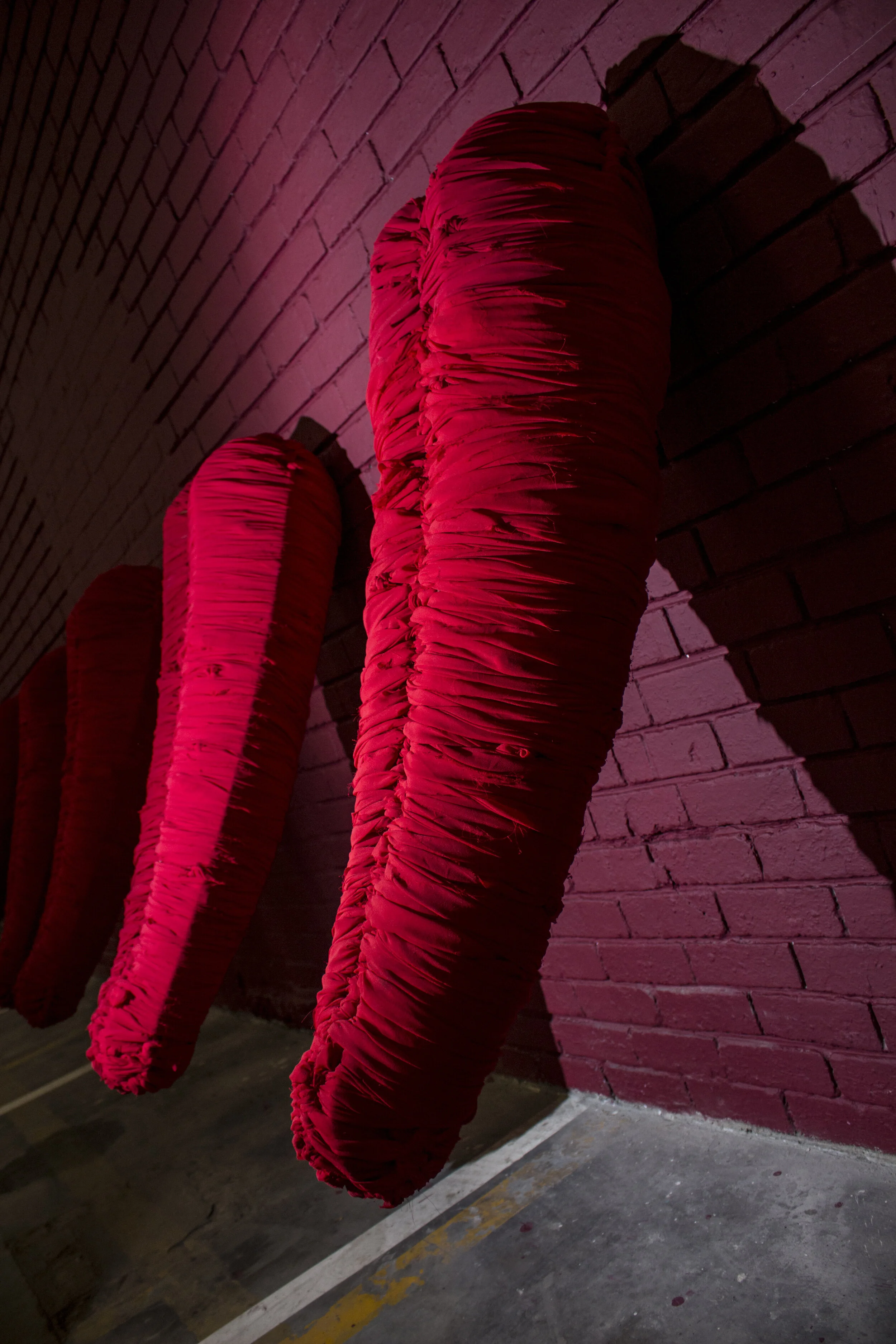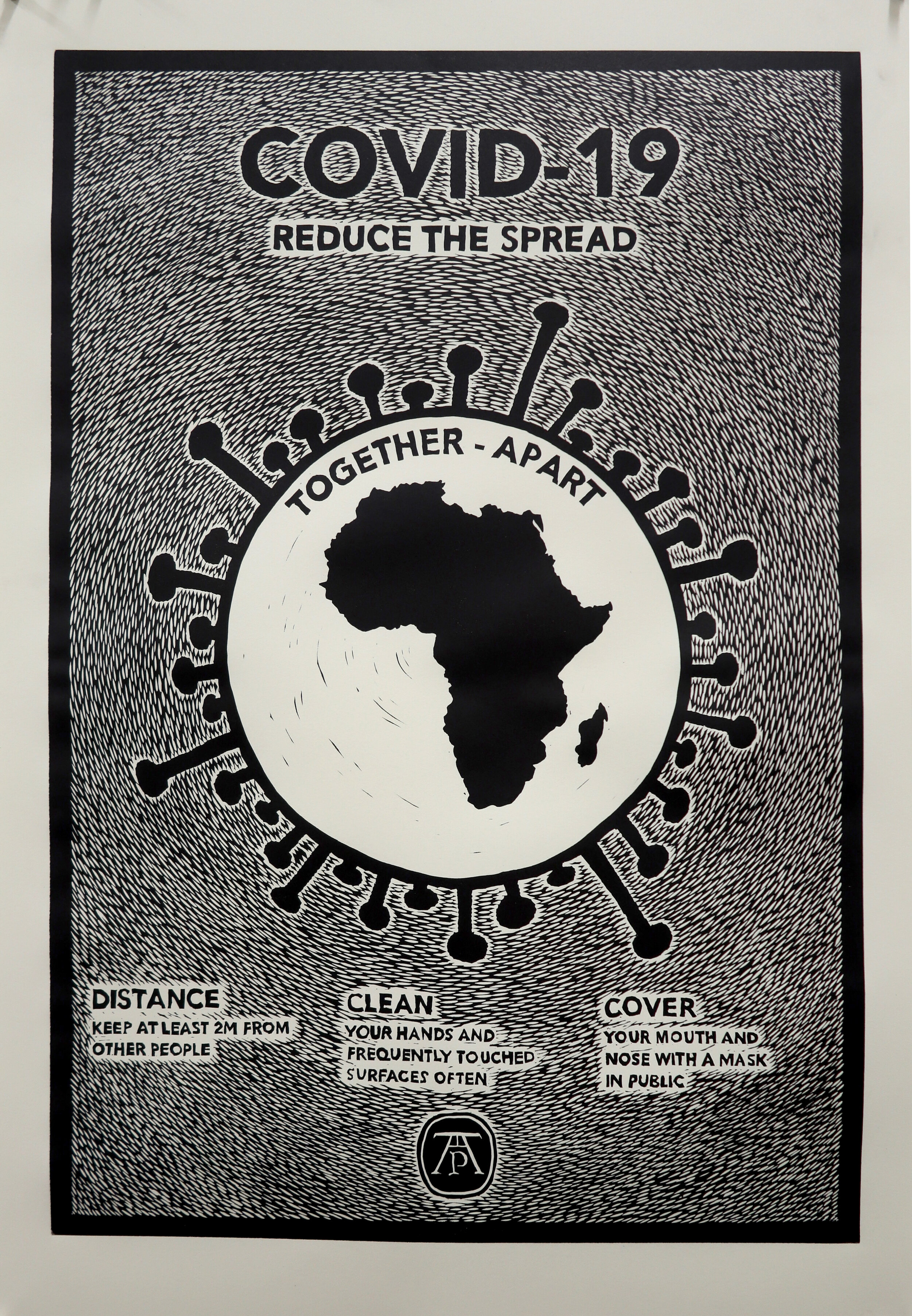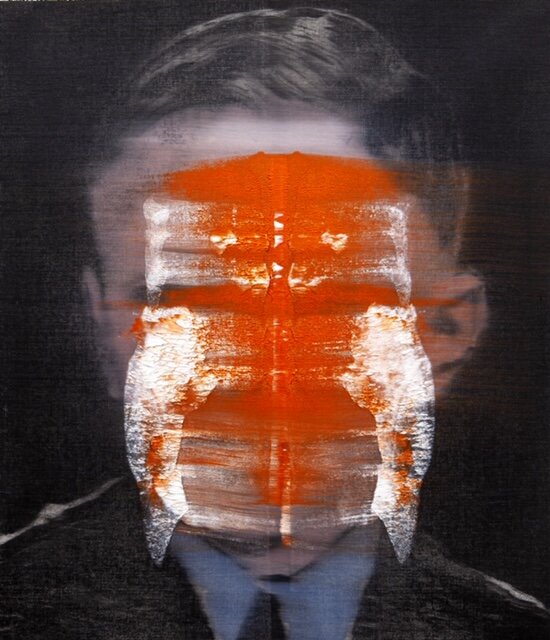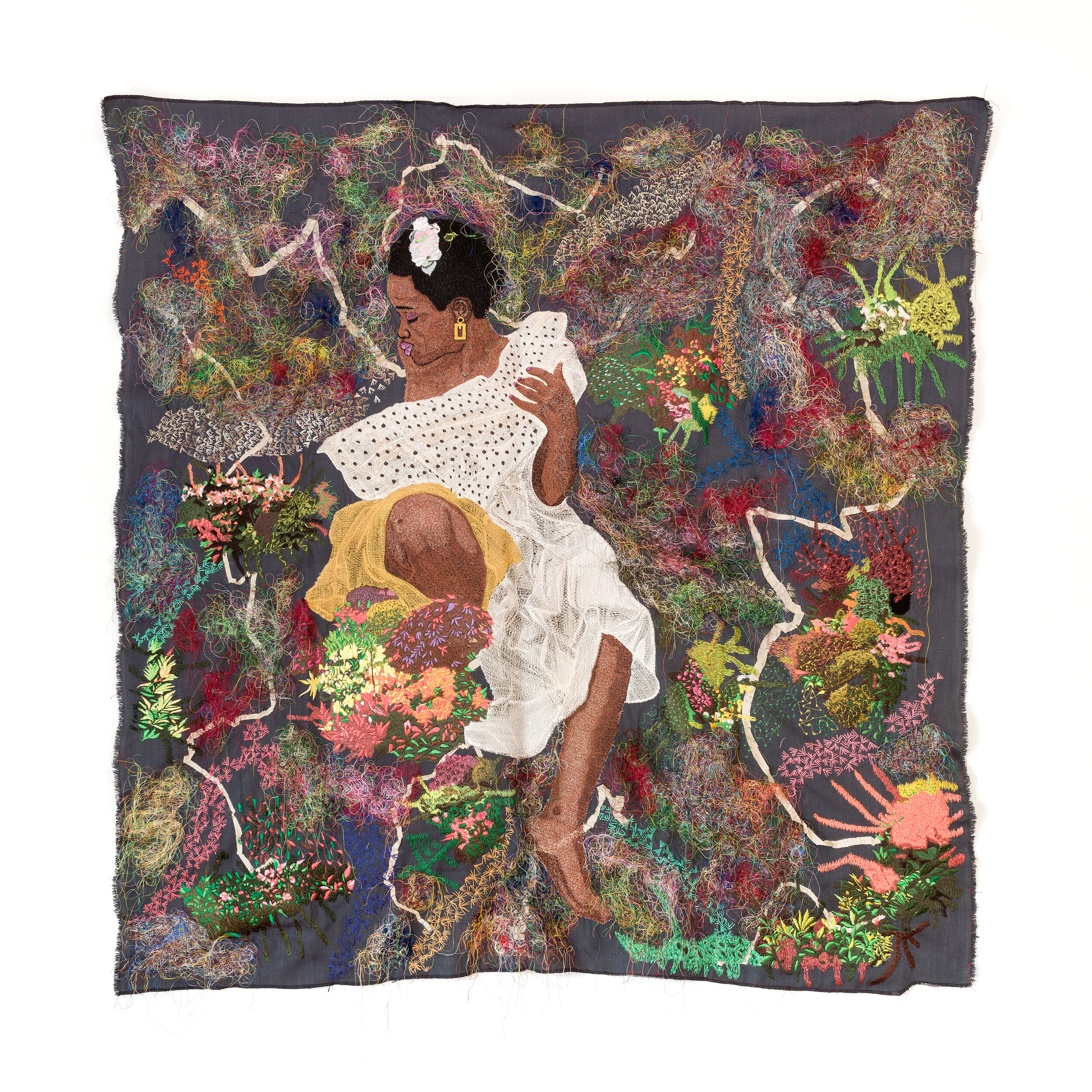Accelerated Entanglements
South Africa’s art world goes online.
With physical events cancelled in 2020, South African art fairs, galleries and artists’ studios have accelerated their online platforms, some of which will run year-round. Despite COVID, the pan-African art market has remained buoyant. Could it be possible that art from the continent is finally able to control its own narrative?
Lawrence Lemaoana, Fools Multiply when Wise Men are Silent, 2019, embroideries on Kanga, 157x117cm. Image courtesy of Afronova.
Collaborative consumption may be the art world’s new order as art fairs navigate their way off floor plans and online. While some artists and galleries may shrug their shoulders considering them “just a bunch of websites” with “viewing rooms” grouped under the name of a fair, for artists in Africa the global acceleration online may mean a significant, welcome shift in visibility and an opportunity to access a whole new set of collectors. With its limited few galleries and tiny art market, important African economic hubs like Johannesburg—AKA African Manhattan—have more artists than collectors, with few opportunities to showcase their work. While top-tier galleries have had significant visits over the years by passionate curators and important collections (such as last year’s discreet visit from thirty Miami-based collectors including Perez Art Museum director Franklin Sirmans and Mr Perez himself) the fourteen-hour flight to the southernmost tip of Africa is a major commitment. With what was pre-COVID Joburg’s “art week” coming up in September, here’s what’s happening at a glance:
Reshma Chhiba, Mother Tongues, 2020, mixed media, dimensions variable. Image courtesy of the artist and photographer (c) Thekiso Mokhele. Chhina will participate in Tactile Visions and New World Order Special Projects at Turbine Art Fair 2020.
RMB Turbine Art Fair turns eight this year, relocating online this time following last year's physical move from the original Turbine Hall in central Joburg. The fair boasts a line-up of loyal supporting galleries, each with dedicated viewing rooms showcasing established and new talent. This year Goodman Gallery will have a presence for the first time at Turbine along with regulars Guns & Rain, Kalashnikovv, David Krut Projects, and others.
Bev Butkow with photography by Thekiso Mokhele, Sedimented Surfaces 1, 2020, Edition of 6. Image courtesy Guns & Rain Art (on view at Latitudes Art Fair Online and RMB Turbine Art Fairs)
Latitudes Art Fair has already made its online presence felt, offering a daily artist showcase to draw online traffic ahead of what would have been its second physical edition in September. Promising the return of a physical edition in Johannesburg for September 2021 to accompany their online profile, the all-woman team ambitiously aim to “change the way art is bought and sold” with a year-round digital platform bringing together an entanglement of galleries, print studios, not-for-profit organizations, curators and independent artists to sell their art side-by-side—including Stephens Tapestry Studio, EBONY/Curated, Zimbabwe’s First Floor Gallery, The Artists’ Press and Warren Editions, to name a few.
Simon Attwood, Covid-19, Reduce the Spread, 2020, single-color linocut on paper, 50 cm x 72 cm. Image courtesy of The Artists' Press, viewing room Latitudes Art Fair Online.
FNB Art Joburg founder Mandla Sibeko confirmed this year’s online edition of the fair promising “augmented and virtual reality exhibition experiences alongside a more traditional web platform”—a move seemingly plugged into the zeitgeist of international survivor fairs such as UNTITLED, ART Online: The World’s First Virtual Reality Art Fair early in August.
Investec Cape Town Art Fair plans to continue with a physical fair in 2021, having made it under the wire for its eighth edition earlier this year—right before COVID cancellations globally. For the entire art week that was this year’s Investec Cape Town Art Fair in February, come nightfall the last of the parties began; invitations flooding inboxes and Instagram DMs with people on the outside anxiously trying to get in, insiders trying to get Ubers out, little black dress wearers clutching clipboards and the ensuring comforting chaos that once was.
Daniel Levi, Omnipresent Funk, 2020, oil on canvas, 70 x 60 cm. Image courtesy of the artist and Kalashnikovv Gallery. Levi's work will be on view at both Turbine and Latitudes Art Fairs online.
Kalashnikovv cleaned up their digital presence with a global strategy including switching website domains from .co.za to .com and expanding their artist lineup. The physical space is still holding it down in Braamfontein while their online YouTube offerings in the “Wreck Room” gather a wider audience globally. The gallery’s July relaunch includes the user-friendly “Collectors incubator” and “Artifacts”—both falling under “conceptual, e-commerce development and implementation” artist and co-owner MJ Turpin tells me.
Goodman Gallery swiftly put together an online program including virtual viewing rooms and a series of Instagram Live sessions in addition to participating internationally on Frieze and Art Basel’s online art fair platforms, RMB Turbine Art Fair, as well as Art Joburg Online in September.
Kimathi Mafofo, The Girl in the Enchanted Garden I, 2020, hand-embroidery and machine embroidery on fabric, 144cm x 142cm. Image courtesy of EBONY Curated.
EBONY Curated has been nurturing new collectors online while encouraging new engagement by photographing art in situ to help collectors visualize what it would be like to live with certain pieces.
First Floor Zimbabwe launched their own online “viewing room” while keeping the gallery open, offering artworks via Latitudes Online and Art Joburg.
Sandile Radebe, portrait by (c) Thekiso Mokhele. Radebe's abstract graphic works feature on Latitudes Art Fair Online in the Bag Factory viewing room.
But what of artful, random chance encounters like the social scenes at galleries that drew creative crowds and culture clashes? One can only hope that the online presence of these creative spaces and makers creates room for similar serendipity.







